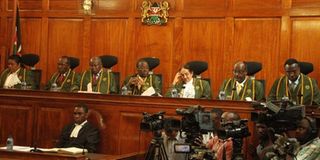Judges give media houses, Communications Authority 90 days to end Digital Migration row

Supreme Court judges during the ruling on digital migration in Nairobi on September 29, 2014. FILE PHOTO |
What you need to know:
- CA was directed to hold talks with the Nation Media Group, Royal Media Services and the Standard Group to resolve the digital migration wrangle.
- Pan Africa Network Group, through it’s local subsidiary, Startimes Media, will keep its licence to distribute digital signals.
The Supreme Court has reinstated the licence of a Chinese company at the centre of the digital migration row, but also ordered an application by local broadcasters be considered afresh.
The Communications Authority of Kenya (CA) is required to consider a licence application for local media houses to distribute digital signals within 90 days.
It was a mixed ruling for the media on Monday because on one hand, the court threw out a Court of Appeal decision automatically awarding big broadcasters a digital licence.
On the other hand, the court firmly underlined the constitutional basis for freedom of expression, and of the media, and criticised the CA for acting as “if the Constitution did not exist”.
CA was directed to hold talks with the Nation Media Group, Royal Media Services and the Standard Group to resolve the digital migration wrangle.
“CAK shall within 90 days consider an application for a licence by the three media houses and in consultation with all parties set the new date for the switch from analogue to digital broadcasting,” the judges ruled.
CUSHION VIEWERS
To secure the massive investment the three media houses have put in analogue broadcasting, the judges directed Parliament to enact a law to ensure the infrastructure does not go to waste by giving an alternative sector where it can be used.
The judges proposed that Parliament considers factors to guide signal distribution in line with constitutional provisions for sustainable development.
To cushion viewers from high costs of acquiring the set-top boxes for receiving digital signals, the Supreme Court ordered the authority to ensure competition in their sale and that they are subsidised.
Pan Africa Network Group, through it’s local subsidiary, Startimes Media, will keep its licence to distribute digital signals.
The judges set aside the Court of Appeal decision, which annulled Pang’s licence.
“We also set aside the order that the local media houses be issued with a licence without going through tendering,” they said.
NO JURISDICTION
The judges overruled the Court of Appeal’s decisions, saying, Judges Roselyn Nambuye, David Maraga and Daniel Musinga had no jurisdiction to issue the orders they gave.
The appellate judges had ruled that the Communications Authority was not the envisioned independent body under the Constitution to regulate broadcast licences. They revoked the licence it had issued to the Chinese firm.
The court said the country could not operate in a vacuum and that the decisions made by CCK before enactment of new legislation to operationalise an independent body were not unconstitutional.
They added that the Court of Appeal ruling on the constitutionality of CCK was not supported by any law since at the time the circumstances under which the authority was formed had not changed.
“We know the power of the media is a double-edged sword that can destroy or build democracy and it was only fair that CCK remained in place to check its activities,” the judges said.
Contrary to what the appellate judges said on legitimate expectation of the three leading media houses to be issued with a digital licence, the Supreme Court ruled that giving them the licence on that basis would be interfering with the independence of the authority.
According to them, there was no basis on which the media houses deserved a licence as a right, and their massive investments alone could not be a basis for legitimate expectation.
The judges further dismissed the Court of Appeal’s ruling that pay television channels had infringed on the intellectual property rights of the three media houses, saying, there was an existing agreement between them to allow the pay TV channels to rebroadcast the programmes.
The unanimous decision was reached by all the judges and read alternately by CJ Mutunga, his deputy Lady Justice Kalpana Rawal and Judges Jacton Ojwang’, Philip Tunoi, Mohammed Ibrahim, Smokin Wanjala and Njoki Ndung’u.
On Monday, ICT Cabinet Secretary Fred Matiang’i welcomed the ruling and asked media owners to consult with them for a final migration date ahead of June 2015 global deadline.
“We want to fully engage stakeholders to develop strategy towards a timely migration; we are also keeping in mind that CA is an independent body. We will not interfere with its final decision,” Dr Matiang’i said.
Additional reporting by Lilian Ochieng’





